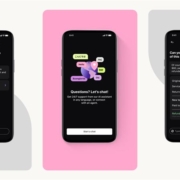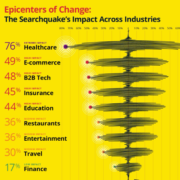AI and the impact on search engines: Welcome to the zero-click world
Developments in the field of AI are having a significant impact on traditional search engines such as Google Search and, consequently, website traffic. Search behavior online is changing rapidly with the emergence of AI tools such as ChatGPT and Perplexity, founded by OpenAI researcher Aravind Srinivas. The "even Googling" is giving way to "even GPTing. What does that mean for you?
With tremendous dominance in search, 9 out of 10, and ad revenue of more than $280 billion last year, Google faces a significant challenge.
My personal experience since the mid-2023s, using AI exclusively as a starting point for my searches (from general information to very specific system user instructions), has caused me to virtually stop using Google Search. I find the user experience with AI chatbots much nicer and more effective. I hear and read from more and more people that they feel the same way.

This trend represents not only a shift in how AI affects SEO, but more importantly how it changes user behavior. The zero-click answers of AI chatbots offer an instant solution without the need to navigate through links, ads, pop-ups, SEO-optimized text and cookies. And you won't be retargeted. This is undoubtedly going to have a big effect on traditional search engines and website visits.
Understanding and anticipating AI-driven search behavior
It is important to understand the shift to AI-driven search behavior and respond proactively to it. Therefore, consider the following:
- Current search behavior of your target audience: Analyze how your target audience currently searches, what tools they use to do so and what their preferences are. Repeat this regularly.
- Your website's future role: Define the desired role your website plays in a landscape where AI provides immediate answers. How will your site remain relevant and attractive to your visitors?
- Adapting your 2024 strategy: Consider whether your strategy adequately addresses the changes in search behavior and the way content is consumed by your audience. This may require a thorough rethinking of your current approach.
Creating AI-friendly and effective content
The goal is to develop content that not only scores well in the new "Search Generative Experience (SGE)" - generating direct, integrated answers to search queries using AI, but also effectively drives visitors to your website.
This includes:
- Visibility in AI tools: Make sure your content is visible and attractive to AI tools such as ChatGPT. This means the content should be very distinctive, clear and informative for answering questions asked.
- Diversification of content formats: Video and audio content, such as podcasts, will become more important. These formats offer a dynamic and more distinctive way to reach and engage your audience.
- Focus on own experiences and unique insights: Share your own experiences, conduct relevant research, and offer unique insights that are also interesting for other media and platforms to publish. This type of content is attractive to AI because it offers unique perspectives and in-depth analysis.
This allows you to respond effectively to the changing dynamics of search engines and AI-driven search behavior. You also simultaneously ensure the relevance and visibility of your content.
Preparing for the future
What actions can you take to prepare for the zero-click world:
- Establish an AI steering committee: Create a multidisciplinary team to lead the development and implementation of AI strategies in your organization. This group will act as "discoverers" of new AI capabilities.
- Experiment with chat search functionality from Bing and Bard: This provides initial insights into the development of generative search experiences. You can also see the extent to which you yourself are or are not visible on key search terms.
- Analyze risks of declining website traffic: Estimate the impact if traffic from Google Search (and paid search) declines starting in 2024.
- Determine your ultimate area of expertise: Research which search terms you have a strong position on that you want to protect (the questions you are the very best at answering) and which questions you want to build a dominant position with answers on.
- Experiment with other channels: Reduce reliance on SEO and SEA by experimenting with other channels where your target audience is active and expects and accepts you.
The importance of content
While content remains crucial to being found, it is important not to focus on producing more generic content with AI. Instead, a thoughtful and transformative content strategy is required.
We are ready to support you in this and together develop a strategy that fits the new reality of search behavior and content consumption.
Take a leap forward in your marketing AI transformation every week
Every Friday, we bring you the latest insights, news and real-world examples on the impact of AI in the marketing world. Whether you want to improve your marketing efficiency, increase customer engagement, sharpen your marketing strategy or digitally transform your business, "Marketing AI Friday" is your weekly guide.
Sign up for Marketing AI Friday for free.









